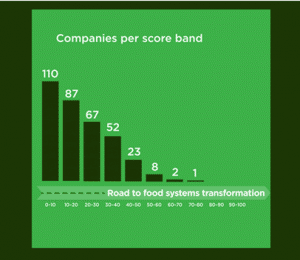The World Benchmarking Alliance’s (WBA’s) first ever Food and Agriculture Benchmark measures and ranks 350 of the world’s most influential food and agriculture companies on their contributions to transforming our global food system. The benchmark builds upon existing frameworks and targets to holistically assess companies from farm to fork on their environmental, nutritional and social impact. The benchmark was launched alongside the 2021 United Nations Food Systems Summit, a critical moment that addressed the interconnectedness of food systems and global challenges such as hunger, climate change, poverty and inequality.
Whilst pressure on the food sector is mounting, many major companies continue to operate business as usual and are not contributing to achieving the Sustainable Development Goals (SDGs). The benchmark data demonstrates that the food and agriculture sector is not on track for transitioning to a sustainable food system. Our key findings reveal worrying gaps in the industry’s preparedness for climate change, progress on human rights and contribution to nutritious diets. The benchmarked companies account for more than half of the world’s food and agriculture revenue, and directly employ over 23 million people. If these companies do not take action now, the SDGs and the Paris Agreement will be further out of sight than ever before. The companies that dominate our global food system are not putting people at the heart of their business or addressing their environmental impact. Providing sustainable livelihoods for farmers, decent employment for workers and nutritious choices for consumers – without depleting natural resources – is essential for the SDG agenda. Yet, the majority of companies perform very poorly.

To have a food system that is fit for present and future generations, food companies have a responsibility to address the environmental, nutritional, and social impacts of their operations and value chains. The sector is a leading contributor to climate change, land degradation and biodiversity loss, risks which have the potential to negatively affect the livelihoods of 500 million smallholder farmers, including some of the world’s most vulnerable people. Additionally, more than one-third of the world’s population cannot afford a healthy diet. The number of people going hungry has risen since the start of the century, and has further increased as a result of the COVID-19 pandemic. Whilst a handful of companies are demonstrating that they are taking necessary steps to implement a sustainable agenda across their business practices, the sector as a whole needs to substantially improve their actions and impact.
Of the 350 companies in scope, only 11 scored over 50/100 in their assessment. Although there is clearly room for improvement by all, interestingly, one company from five of the six-value chain segments was represented across the top performers. The only segment that did not score over 50/100 are the restaurants & food service companies. This demonstrates that leadership and positive change can and must come from every part of the value chain, supporting the WBA’s guiding principle that a company of a certain size and influence can and must contribute holistically across the food systems transformation agenda. Unilever, Nestlé and Danone, well-known brands, top the overall ranking. But beyond the top performers, scores decrease rapidly. Most strikingly, 229 of all companies assessed are performing below 25/100. However, most of the targets and commitments that companies have set need to be realised at farm level or in the supermarkets and restaurants. If conditions are to improve for the millions who depend on agriculture for their livelihood and the most vulnerable families that cannot afford a healthy diet, we need all companies across the value chain to take action and recognise the role they play in the larger system.
The 2021 UN Food Systems Summit has been a pinnacle moment to address the interconnectedness of food systems with global challenges such as hunger, climate change and poverty. In the lead up to the event, multistakeholder actors have come together to commit to deliver on the 2030 Agenda. In parallel, WBA has been developing this systems-wide benchmark serving as the accountability mechanism for the private sector. We intend to publish a new iteration of the Food and Agriculture Benchmark every two years, tracking performance until 2030. With less than a decade left it is imperative to act now. Companies from across the sector must become successful drivers of change and demonstrate strong, fair and innovative leadership. Please visit our website for more data and insights, as well as ways you and your organisation can join the Alliance and strengthen the movement of change.
You can access the full results and dataset behind the WBA Food and Agriculture Benchmark 2021 here.
